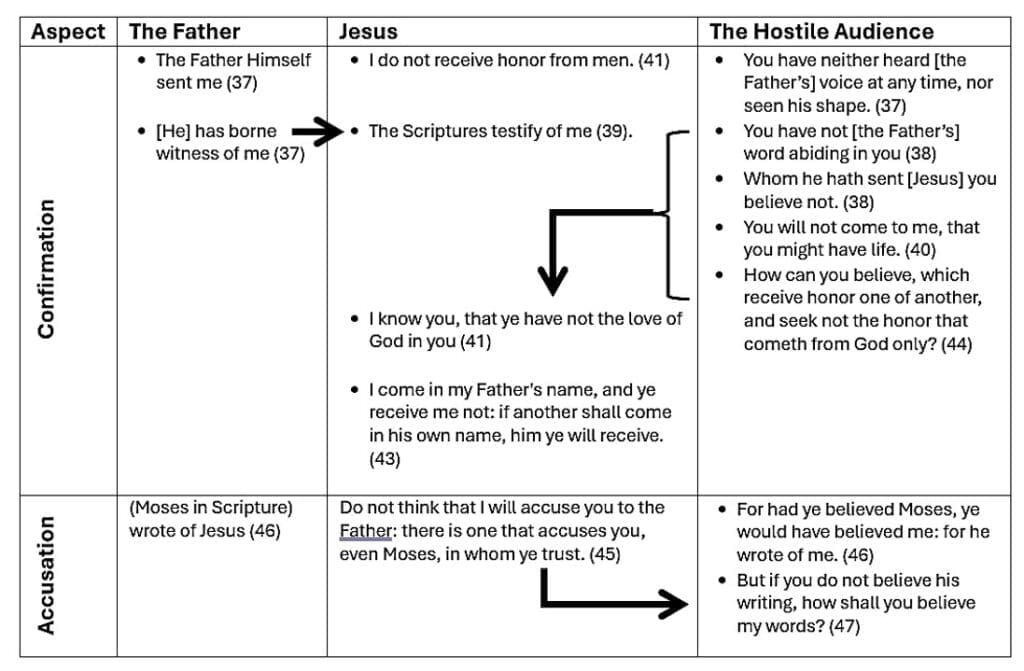Wisdom Wednesday: Wisdom in John’s Gospel Part 4 (of 8)
Chapter 5 The Testimony Confirming Jesus’ Authenticity
Submitted by Debbie’s Dad
If I alone testify about Myself, My testimony is not true. There is another who testifies of Me, and I know that the testimony which He gives about Me is true. John 31-32 (NASB 95)
In this series, we examine God’s wisdom, presented in the message in the Gospel according to John. In the precious parts of this series, we saw the emphasis on Who Jesus was (chapters 1-3) and the spiritual truth He brought (chapters 3 and 4). In chapter 5, we will see how He validated His claim to be God’s Son as declared in Old Testament Scripture. Those who recognized Him were wise.
The account in chapter 5 begins a period of Jesus’ ministry referred to by commentators as the period of controversy. The chapter describes Jesus’ visit to Jerusalem for a feast (perhaps Passover, but it is not stated) and his healing at the pool of Bethesda of the man who was disabled for 38 years. (5:1-9) This healing took place on the Sabbath and Jesus. when challenged about his “work” on the Sabbath Day of rest, Jesus replied, “My Father is working until now, and I Myself am working.” (v. 17) His response angered the Jews, and John explains:
For this reason therefore the Jews were seeking all the more to kill Him, because He not only was breaking the Sabbath, but also was calling God His own Father, making Himself equal with God. (5:18).
Jesus responded to their anger with an explanation:
- He does the Father’s will and behaves like God the Father. Even as the Father gives life and raises from the dead, the Son will also. (vv. 19-21)
- The Father also gave judgment to the Son (Jesus) and those who honor the Son gave evidence that they also honor the Father (vv. 22-23)
- AND, those who hear the Son and believe in the Father do not come into judgment but pass from death to life. (v.24)
- SO, there is a resurrection judgment coming and two resurrections- a resurrection for those who did good deeds to life and a resurrection for those who committed evil deeds to judgment. (vv. 25-29)
- Jesus is the true judge (v. 30)
And next, Jesus moved from explanation to the confirmation of his authenticity as God’s Son. He claimed the Father has provided witness of Him (in his miraculous works), and the Scriptures testify of Him. Jesus does not authenticate Himself, but the Scriptures do. The hostile audience rejects Him because they do not have God’s word (Scripture) guiding them, and they do not believe, and they are accused by Moses’ own writings. The figure below illustrates the flow of Jesus’ explanation and condemnation in verses 37-47.

Jesus condemned them for unbelief–not in Him, the Son of God the Father, but in the Father Himself! Jesus’ logic, here in this condemnation of his accusers, is that they do not believe in the Father (Jehovah, the only God)–a most serious and severe assertion!
Here is a summary of the logic of His stern condemnation:
- . . you believed in the Father
THEN . . .
You would have His Word abiding in you (38)
You would have the love of God in you (42)
You would see the Scripture references that confirm He is the Son (39)
You would come to the Son (40)
You would recognize and Believe in the Son
BUT SINCE . . .
You do not believe Moses’ writings (47)
You will not believe the Son’s words (47)
You do not seek the honor that comes from the only God (44)
You are accused by Moses (45) . . . (of unbelief in Jehovah)
THEREFORE [implied]… You do not believe Me and are condemned by Moses
After His resurrection, Jesus appeared to Cleopas and another discouraged follower on the road to Emmaus, a town about 7 miles from Jerusalem. Not realizing it was their resurrected Lord walking with them, they recounted the events of the crucifixion and rumors of the resurrection from their bewildered perspective. Jesus chastised them as being foolish (unwise) for not clearly understanding the Scriptures, then Jesus turned to be their comforting teacher and shared with them wisdom:
“Then beginning with Moses and with all the prophets, He explained to them the things concerning Himself in all the Scriptures.” (Luke 24:27)